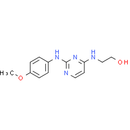Description
Cardiogenol C is a potent cell-permeable pyrimidine inducer which prompts the differentiation of ESCs into cardiomyocytes (EC50=100 nM). Cardiogenol C also acts cardiomyogenic on already lineage-committed progenitor cell types with a limited degree of plasticity. Cardiogenol C is a useful cardiomyogenic agent and can be used as a tool to improve cardiac repair by cell transplantation therapy in animal models.
Product information
CAS Number: 671225-39-1
Molecular Weight: 260.29
Formula: C13H16N4O2
Chemical Name: 2-({2-[(4-methoxyphenyl)amino]pyrimidin-4-yl}amino)ethan-1-ol
Smiles: COC1=CC=C(C=C1)NC1N=C(C=CN=1)NCCO
InChiKey: LKBSMPFEKIBRGC-UHFFFAOYSA-N
InChi: InChI=1S/C13H16N4O2/c1-19-11-4-2-10(3-5-11)16-13-15-7-6-12(17-13)14-8-9-18/h2-7,18H,8-9H2,1H3,(H2,14,15,16,17)
Technical Data
Appearance: Solid Power
Purity: ≥98% (or refer to the Certificate of Analysis)
Solubility: Soluble in DMSO
Shipping Condition: Shipped under ambient temperature as non-hazardous chemical or refer to Certificate of Analysis
Storage Condition: Dry, dark and -20 oC for 1 year or refer to the Certificate of Analysis.
Shelf Life: ≥12 months if stored properly.
Stock Solution Storage: 0 - 4 oC for 1 month or refer to the Certificate of Analysis.
Drug Formulation: To be determined
HS Tariff Code: 382200
How to use
In Vitro:
Cardiogenol C (1 μM; 7 days) has a cardiomyogenic effect on P19 cells, it significantly increases atrial natriuretic factor (ANF, nppa) in P19 cells when it compares to untreated control cells. Cardiogenol C (0.01-100 μM; 7 days) significantly increases ANF expression. In addition, another frequently used cardiac marker gene (NKX2-5) is also significantly increased by this small molecule in C2C12 cells. Cardiogenol C (0.001-100 μM; 7 days) increases cardiac Nav1.5 sodium channel protein expression as dose-dependent manner in C2C12 cells. Cardiogenol C (0.01-100 μM; 7 days) does not effect cell growth even at 10 μM. In addition, Cardiogenol C either solves in water or DMSO generates a similar effect. The highest concentration, 100 μM has significant cellular toxicity on C2C12 cells.
References:
- Mike AK, et al. Cell Physiol Biochem. 2014;33(1):205-21.
Products are for research use only. Not for human use.
Payment & Security
Your payment information is processed securely. We do not store credit card details nor have access to your credit card information.


